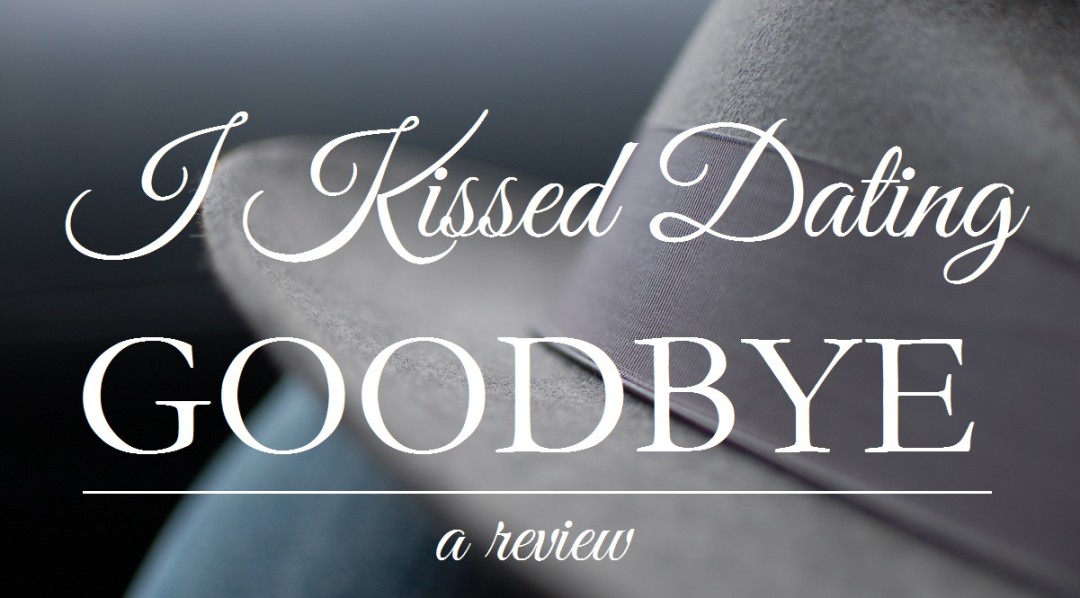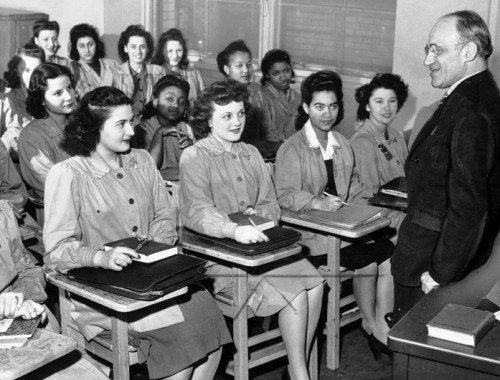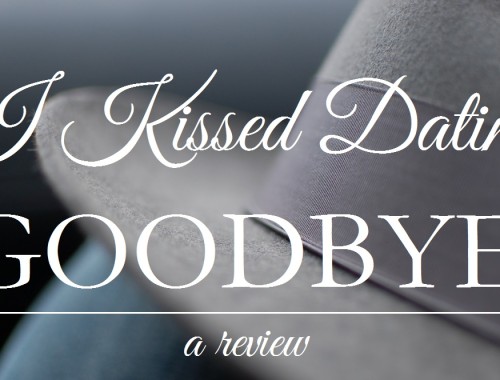We made it all the way through to the end of I Kissed Dating Goodbye. He ends it better than some of the other books I’ve reviewed– there’s an actual summation and conclusion at the end of it, and he wraps it up in a way that makes it feel finished. Considering the number of non-fiction books I’ve read that just sort of meander their way to an ending before finally sputtering out, this is actually an accomplishment.
One of the interesting things that jumped out to me is that he finishes it like he opens it: with the assertion that he’s not really trying to tell us exactly how to “date” or “court” … but then he says that his way actually is God’s way. See here:
I hope to give a broad outline of how a God-honoring relationship can unfold … just as a one-of-a-kind snowflake can only form at a specific temperature and precipitation, a God-honoring romance can only form when we follow godly patterns and principles. (187)
We need new attitudes– values that are shaped by Scripture and a radically God-centered view of romance. (188)
I think these seasons can help us develop godly romantic relationships. (189)
The new pattern we’ve discussed is only an outline. As with anything, a couple can manipulate it to fulfill on the minimum requirements. (202)
All of these statements come with some sort of caveat in the surrounding text, like “every relationship is different, blah blah blah,” but an important thing to note is that when a fundamentalist says that, and then follows it up with “but my way is God-honoring and godly,” (like Joshua does a half dozen times), they don’t really mean it. It makes them sound like they’re reasonable and accommodating, but they’re not. His way honors God, and your way doesn’t. There’s not a lot of room for argument against that in fundamentalist culture.
Another pattern of this last section is the way he’s forcing everything to fit under a complementarian view of the world. He likes the term courtship instead of dating not because he finds an antiquated approach to the “marriage market” more biblical, but because it invokes a sense of chivalry (188). Chivalry, like I make clear at the link, is benevolent sexism that relies on sexist perceptions of women as being “weak” and needing “protection.” It should surprise no one that Joshua holds to this attitude, but it comes out in some interesting ways:
[Clearly defining the purposes of the relationship] specifically applies to the guys, who I believe should be the ones to “make the first move.” Please don’t misunderstand this as a chauvinistic attitude … the Bible clearly defines the importance of a man’s spiritual leadership in marriage, and I believe part of that leadership should begin in this season of the relationship. (196)
Oh, I’m not misunderstanding anything. Chauvinism is the belief that men are superior to women, and by saying that men are the ones who are the ones who lead, the ones who are obeyed, the ones who are submitted to for no other reason besides their gender, you are asserting that men are superior to women. I’m sick of complementarians refusing to own this. They know it’s bad, they know that it’s wrong, but they want to get all the benefits of patriarchy without copping to it.
There’s also this:
A young man out to show respect for the person responsible for the girl. If that means approaching her pastor or grandfather, do it. (197)
This is supposedly to take place once the people involved are at a life stage where considering marriage and setting up their own independent household is a mature decision, but Joshua just assumes that there will be a man in the young woman’s life who is “responsible” for her, as in she cannot make decisions on her own or take care of herself independently. In fact, in the last chapter, Joshua criticizes his mother for being too “head-strong” and “independent” at the time she met his father (205). Also notice the “man/girl” language that he’s using again. This is a small, linguistic illustration of Joshua’s belief that men are superior. Men are automatically more mature and capable than “girls.”
Also, when Handsome and I were dating, one of the things we settled on in the early days was that we weren’t going to consider anything “serious” until we’d been together for a year. That didn’t last, and it didn’t last because I was the one who said, after six months, that I wanted to become more committed. I brought it up to talk about it first– and after we talked about it together, we agreed. He proposed two months later, and we got married after dating for eleven months (I don’t recommend this for everyone, but it worked for us).
I can’t even imagine a scenario where two people are ready to consider marriage where the woman isn’t even responsible for herself and is dependent on the men in her life to tell her where to go and what to do and who to date and when to get married. It’s ridiculous.
The last section is dedicated to laying out what Joshua calls “the seasons of the relationship”:
- Casual friendship
- Deeper friendship
- Courtship
- Engagement
He obviously thinks this approach is a healthy, appropriate, and mature, and I disagree because his approach has the couple moving “beyond” or “past” friendship once they reach stage three. To him, once “romance” has entered the picture, something fundamental about the relationship shifts. Friendship isn’t intimate, friendship can’t be romantic.
I don’t think this is a healthy view of either romance or friendship. I’m within sight of thirty years old, and the lasting friendships I have are still there because of relational intimacy. We know each other extremely well– we can predict each other’s sentences, opinions, reactions. We understand our life stories, the complicated set of events and personality that make up who we are. We’ve let down walls and boundaries that keep acquaintances at arm’s length, and that comes with risk.
These sorts of relationships are rare, but they’re incredibly important. And when I look over the past few years with Handsome, I know I decided to marry him first of all because he is my friend. I wanted to move into the same house as him, talk to him every day, because of friendship. There’s very little that separates my relationship with him from my relationships with close friends– he’s just my best friend, the person I decided I was the most compatible with. There’s romance on top of that, and I’m in love with him, but that’s icing on top of our friendship cake. We enjoy the same books, the same movies, the same video games. We live life at the same pace. We have similar communication styles. We value and prioritize the same things.
The same can be said, to a lesser degree, of those I consider my friends.
Joshua envisions a life-partner relationship as being fundamentally different from friendship, as though married people have a completely different way of interacting with each other than friends do. This is probably due to the fact that he’s never been in a serious relationship, let alone married, but I’m not entirely sure that his perspective has changed much, even though he’s married now– and I think that’s because of complementarianism.
In a friendship, the man doesn’t have an automatic trump card. In a friendship, there’s no requirement for the woman to obey and submit. In a friendship, there’s no hierarchy, no authority, no spiritual headship.
Friendship implies equality.
In the end, I think that’s the saddest thing about I Kissed Dating Goodbye. Joshua seems like a decent, earnest young person. I think he would appreciate all the benefits of an egalitarian marriage, of having a competent and capable life-partner by his side, who can support him and challenge him… but he doesn’t think that anyone can have that, especially not him.
***
Next up, I’m going to be reviewing Francine Rivers’ Redeeming Love. I haven’t read it before, and it’s my first fiction review on the blog, so we’ll see how that goes. Dani Kelley has some introductory notes on it, and there’s an excellent long-form review by Lindsay, so if you’re not familiar with Redeeming Love those are two good places to start. There’s also the option of reading it along with me and having a book club-style discussion in the comments. Since it’s fiction, there will be a lot more room for interpretation.
If doing a fiction review pans out, I’m thinking of digging into some of Christian culture’s favorites, like oh say The Drums of Change by Janette Oke or The Princess by Lori Wick. Let me know if that’s something y’all’d be interested in.



